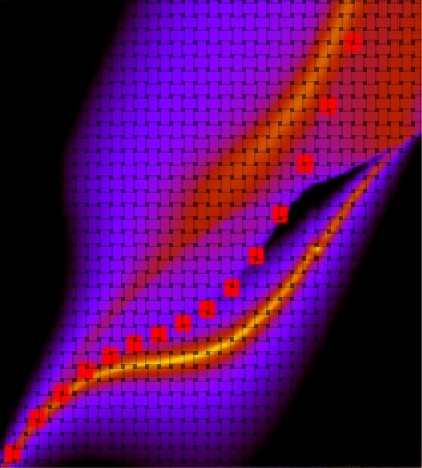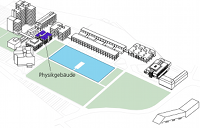Position Indication:
Content

QFS 2010 Satellite Workshop - Cold Gases meet Many-Body Theory

Jordi Boronat
jordi.boronat@upc.edu
Markus Holzmann
markus@lptl.jussieu.fr
Anna Minguzzi
anna.minguzzi@grenoble.cnrs.fr
Eckhard Krotscheck
Eckhard.Krotscheck@jku.at
Birgitta Whaley
whaley@berkeley.edu
Over the past 10 years, experimental progress in realizing strongly interacting cold atomic gases have stimulated an enormous surge of interest in examining their properties, for both fermionic and bosonic systems. In atomic gases, correlated regimes are experimentally accessible using Feshbach resonances to tune the scattering length to large values. Current experiments have now started to go beyond the dilute-gas limit, accessing regimes which cannot be described using a single-particle or mean-field description and where many-body correlations are essential for their understanding. Interacting fermions in the BEC-BCS crossover, dense Bose gases, spinor systems and bosonic and fermionic systems on lattices are just a few examples which show clear signatures of correlations.
Correlation effects are well known in the field of quantum fluids. Accurate descriptions of quantum many-body correlations have always been central for the understanding of properties in nuclei/nuclear matter, helium fluids, and strongly correlated electron systems. The many sophisticated theoretical methods have been developed over the years in these areas have significant potential for application to cold gases in the strongly interacting regime that is now opening up to experimental investigation.
A satellite workshop of QFS 2010
Cold Gases meet Many-Body Theory
will be held on August 7, 2010 and will take place at the Instutut Laue-Langevin, 6, rue Jules Horowitz, Grenoble
It aims to bring together the two communities of quantum fluids and cold gases in order to stimulate fruitful interactions and to explore the application of quantum many-body methods to cold gases. Doing this as a satellite in conjunction with the QFS 2010 symposium is a highly efficacious way to bring the two communities together and will capitalize on the presence of a usually significant group of quantum fluid theorists at the QFS symposia.
Interested colleagues are kindly invited to contact one of the organizers. If needed, we will consider to extend the meeting by one half day in the morning of Aug. 8.
Please check the official website of the QFS 2010 symposium
 venue
(472Bytes)
venue
(472Bytes)
for further information.
List of participants as of July 27, 2010
Francesco Anchilotto Padova
Gregory Astrakharchik Barcelona
Yuriy Bunkov Grenoble
David Ceperley Urbana
Marc Cheneau Muenchen
Thomas Eggel Tokyo
Giulia Ferrini Grenoble
Carmen Gordillo Sevilla
Elena V. Gorelik Mainz
Gregoire Guillon Rennes
Susana Hernandez Buenos Aires
Markus Holzmann Grenoble
Diana Hufnagl Linz
Yusuke Kato Tokyo
Wolfgang Ketterle MIT
Eckhard Krotscheck Linz
Anatoly Kuklov Staten Island
Lev Levitin London
Yaroslav Lutsyshyn Barcelona
Oleg Matveev Lviv
Mykola Maksymenko Lviv
Anna Minguzzi Grenoble
Jesus Navarro Valencia
Xavier Plat Grenoble
Marco Polini NEST
Tommaso Roscilde Lyon
Luca Salasnic Padova
Matteo Sandri Grenoble
Christoph Schenke Grenoble
Aleksandr Sukhanov Dubna
Myroslava Topilko Lviv
Jacques Tempere Antwerpen
Silvio Vitiello Campinas
Robert Zillich Linz
-
 astrakharchik_presentation
(6.6 MB)
astrakharchik_presentation
(6.6 MB)
-
 bunkov_presentation.pdf
(11.7 MB)
bunkov_presentation.pdf
(11.7 MB)
-
 ceperley_presentation.pdf
(1.0 MB)
ceperley_presentation.pdf
(1.0 MB)
-
 gorelik_presentation
(18.6 MB)
gorelik_presentation
(18.6 MB)
-
 abstract_guillon
(34KB)
abstract_guillon
(34KB)
-
 Ketterle_presentation
(4.9 MB)
Ketterle_presentation
(4.9 MB)
-
 kuklov_presentation
(34KB)
kuklov_presentation
(34KB)
-
 polini_presentation
(5.3 MB)
polini_presentation
(5.3 MB)
-
 abstract_roscilde
(42KB)
abstract_roscilde
(42KB)
-
 zillich_presentation
(3.9 MB)
zillich_presentation
(3.9 MB)
-
 salasnich_presentation
(158KB)
salasnich_presentation
(158KB)
-
 Program as of July 16
(17KB)
Program as of July 16
(17KB)
-
 Introduction to ILL
(3.5 MB)
Introduction to ILL
(3.5 MB)


 Audit hochschule und familie
Audit hochschule und familie


